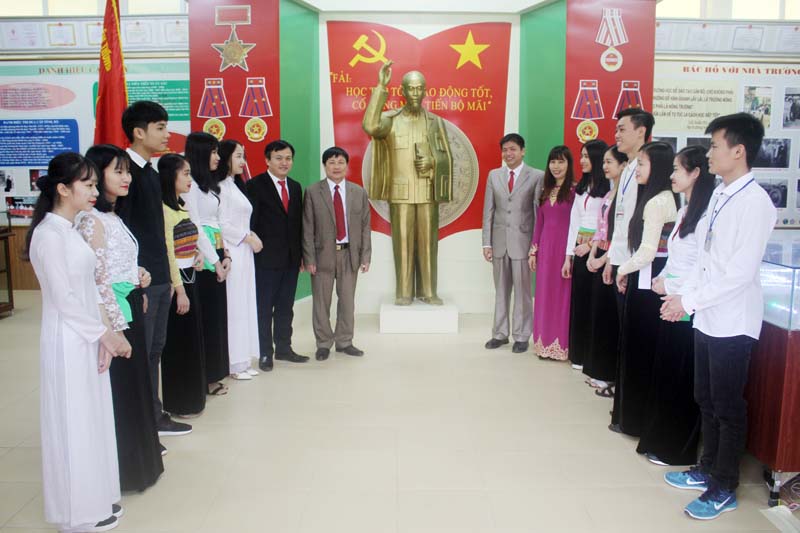
(HBO) - Innitiated by the provicial chapter of the Ho Chi Minh Communist Youth Union, the Hoa Binh School of Young Socialist Workers, a model that integrated both learning and working activities, was established on April 1, 1958.
%20(1).jpg) The school’s management
board and generations of students review its glorious history intertwined
with teachings of late President Ho Chi Minh.
The school’s management
board and generations of students review its glorious history intertwined
with teachings of late President Ho Chi Minh.
On August 17, 1962, the late President visited the school. In 1991, the
facility changed its name intothe provincial Boarding
School for Ethnic Minority Students, considering the President’s teachings
during his visit – "study well, work well, exert efforts forever and improve forever” – as its motto for
operation.
Currently, the school runs
22 classes with 728 students, of which 13 are high-quality ones in terms of literature,
math, and English. It has 87 teachers who were trained in line with standards.
The school consists of 30 classrooms, two libraries with 22 computers,
and one multi-functional centre. Particularly, it has a traditional house to
educate students about the
school’s history and achievements.
As a centre for training students from local ethnic minority groups,
the school has so far gained encouraging results at different exams. For
example, it recorded 99.56 percent and 96.92 percent of students passing the national
high school graduation examination and university entrance exam last year. In the first semester of the
2019-2020 academic year, it saw 92.86 and 99.87 percent of students achieving
good and excelent levels in study and moral conduct, respectively.
The establishment also frequently creates healthy and useful extracurricular activities to
help its boarding students enhance their life skills and virtue. A highlight in
these activities is the "30 golden minutes” programme taking place every Monday
mornings./.
In the spirit of "Party members go first, the people follow”, all households of Party members in the Doan Ket sub-region in Da Bac town, Da Bac district, voluntarily removed gates and fences, and donated land when the road expansion project passed through their properties. Inspired by their example, 68 households in the sub-region quickly followed suit, contributing over 1,400 sq.m of residential and perennial cropland to widen the main road through the residential area. The exemplary role of Party members in Doan Ket stands as a shining example of studying and following President Ho Chi Minh’s thought, morality, and lifestyle.
The Hoa Binh provincial People's Committee held a monthly meeting on May 29 to assess the implementation of socio-economic development tasks in the first six months of 2025, the progress of key projects, and some other important issues.
During his lifetime, President Ho Chi Minh always expressed his deep affection and special concern for children and youth. He once emphasized: "Caring for and educating children well is the responsibility of the entire Party and the entire people”; "First of all, the family (i.e. grandparents, parents, siblings) must do this job well”. "the Party Committees…, the Children’s Committee, the Youth Union, the education sector, and all related organizations must have specific plans to ensure children grow healthier and more progressive”. His teachings has been remaining valuable and serving as the guiding principles in the work of protecting, caring for, and educating children. In line with this ideology, Hoa Binh Province has continuously been prioritizing and investing resources in the well-being of children in recent years.
Mr. Nguyen Phi Long, the alternate Member of the Party Central Committee and Secretary of the Provincial Party Committee chaired the meeting of the Standing Committee of the Provincial Party Committee to provide opinions on several investment projects within the province. There was the attendance of Ms. Bui Thi Minh, the Permanent Deputy Secretary of the Provincial Party Committee and Chairwoman of the Provincial People’s Council; Mr. Bui Đuc Hinh, the Deputy Secretary of the Provincial Party Committee and Chairman of the Provincial People’s Committee and other members of the Standing Committee; the leaders from other departments, agencies, and some localities.
The Standing Board of the Vietnam Fatherland Front (VFF) Committee of Hoa Binh province held a meeting on May 28 to honour outstanding village elders, village heads, and reputable individuals from local ethnic minority and religious communities.
In mid-May, the provincial Museum organised an exhibition named "Duoi la co Dang Cong san Viet Nam quang vinh” (Under the flag of the glorious Communist Party of Vietnam). This meaningful activity took place in the joyful atmosphere to celebrate the country's major holidays and the Party congresses at all levels for the 2025-2030 term, towards the 14th National Party Congress.



%20(1).jpg) The school’s management
board and generations of students review its glorious history intertwined
with teachings of late President Ho Chi Minh.
The school’s management
board and generations of students review its glorious history intertwined
with teachings of late President Ho Chi Minh.